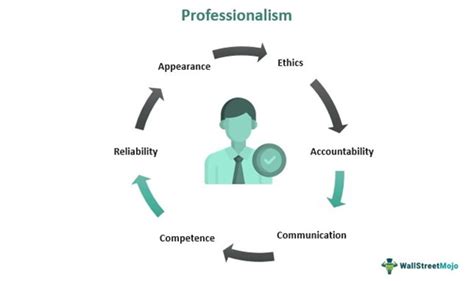Definition and Significance
Pre-professionalism refers to the period before an individual enters a professional career. It encompasses the development of knowledge, skills, values, and experiences that prepare an individual for success in their future profession. By engaging in pre-professional activities, individuals gain a competitive edge and establish a strong foundation for their professional journey.

The Importance of Pre-Professionalism
According to the National Center for Education Statistics, over 80% of college graduates enter the workforce in pre-professional roles. The benefits of pre-professionalism extend beyond securing employment and include:
- Enhanced Knowledge and Skill Acquisition: Pre-professional experiences provide opportunities to develop practical skills and expand theoretical knowledge in a real-world setting.
- Professional Networking: Internships, research projects, and professional development events connect individuals with potential employers, mentors, and peers.
- Exposure to Professional Norms: Pre-professional experiences expose individuals to the ethical standards, communication styles, and workplace cultures of their desired professions.
- Increased Confidence and Maturity: By taking on challenges and responsibilities in pre-professional roles, individuals develop self-assurance and a sense of professional identity.
Key Components of Pre-Professionalism
A comprehensive pre-professional experience should include the following key components:
- Internships and Externships: These structured programs provide hands-on experience in a professional environment, allowing individuals to apply their knowledge, develop skills, and make meaningful contributions.
- Research Projects: Engaging in research projects enhances critical thinking, problem-solving, and communication skills while contributing to the body of knowledge in a specific field.
- Professional Development: Workshops, conferences, and online courses offer opportunities to stay abreast of industry trends, expand skill sets, and develop leadership abilities.
- Mentoring and Coaching: Guidance from experienced professionals provides valuable support, career advice, and role modeling.
- Professional Organizations: Joining professional organizations connects individuals with like-minded peers, offers networking opportunities, and provides access to exclusive resources.
Strategies for Effective Pre-Professionalism
To maximize the benefits of pre-professionalism, individuals should employ effective strategies, including:
- Proactive Planning: Develop a career plan that aligns with personal interests and goals, and identify opportunities for pre-professional experiences.
- Networking: Attend industry events, connect with professionals on LinkedIn, and seek out mentorship opportunities.
- Skill Development: Focus on developing skills and knowledge that are relevant to the desired profession.
- Communication and Presentation: Enhance communication and presentation skills to effectively convey ideas and build rapport.
- Ethical Behavior: Adhere to professional standards of conduct, integrity, and confidentiality.
Conclusion
Pre-professionalism is an essential stepping stone for a successful career. By engaging in pre-professional activities, individuals gain invaluable knowledge, skills, and experiences that prepare them for the rigors of their future professions. By embracing the key components of pre-professionalism and employing effective strategies, individuals can optimize their pre-professional journey and lay a solid foundation for a rewarding career.
Table 1: Benefits of Pre-Professionalism
| Benefit | Impact |
|---|---|
| Enhanced Knowledge and Skill Acquisition | Increased job readiness and career competitiveness |
| Professional Networking | Access to job opportunities, mentors, and industry connections |
| Exposure to Professional Norms | Understanding of ethical standards and workplace expectations |
| Increased Confidence and Maturity | Development of professional identity and self-assurance |
Table 2: Key Components of Pre-Professionalism
| Component | Description |
|---|---|
| Internships and Externships | Hands-on experience in a professional setting |
| Research Projects | Development of critical thinking, problem-solving, and communication skills |
| Professional Development | Acquisition of industry knowledge and leadership abilities |
| Mentoring and Coaching | Guidance and support from experienced professionals |
| Professional Organizations | Networking, professional development, and exclusive resources |
Table 3: Effective Pre-Professionalism Strategies
| Strategy | Description |
|---|---|
| Proactive Planning | Development of a career plan and identification of pre-professional opportunities |
| Networking | Building relationships with professionals, mentors, and peers |
| Skill Development | Acquisition of skills and knowledge relevant to the desired profession |
| Communication and Presentation | Enhancement of communication and presentation skills |
| Ethical Behavior | Adherence to professional standards of conduct |
Case Study: Pre-Professionalism in the Medical Field
According to the Association of American Medical Colleges, 90% of medical school applicants have participated in at least one pre-professional activity. These activities include:
- Internships in hospitals and clinics: Providing hands-on experience in various clinical settings.
- Research projects: Conducting research in areas of interest, such as disease prevention or treatment.
- Shadowing physicians: Observing the daily activities and responsibilities of practicing physicians.
- Volunteering in healthcare organizations: Gaining exposure to the healthcare system and interacting with patients.
Pre-professionalism in the medical field enables aspiring physicians to develop a comprehensive understanding of the profession, acquire valuable skills, and build a strong foundation for their future careers.
Innovative Applications of Pre-Professionalism
One innovative way to generate ideas for new applications of pre-professionalism is to use the technique of brainstorming. Brainstorming is a collaborative process that involves generating a large number of ideas, regardless of their feasibility or practicality.
To conduct a brainstorming session on pre-professionalism, bring together a group of individuals with diverse backgrounds and perspectives. Present the following question: “What are some creative and innovative ways to use pre-professional experiences to prepare individuals for the future workplace?”
Encourage participants to think outside the box and propose unconventional ideas. Record all ideas, no matter how outlandish they may seem. Once the brainstorming session is complete, review the ideas and identify those that have the potential to be further developed and implemented.
Conclusion
Pre-professionalism is a crucial stage in the development of successful professionals. By engaging in pre-professional activities, individuals gain invaluable knowledge, skills, and experiences that prepare them for the challenges and opportunities of their future careers. By adopting effective strategies and exploring innovative applications of pre-professionalism, individuals can maximize their potential and achieve their professional goals.
